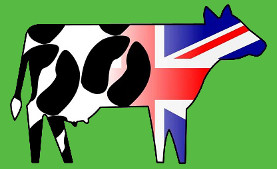By DesCoteaux, L. and Dohoo, I. R. and Dowling, P. and Fredeen, A. and Leslie, K. and Preston, A. and Shewfelt, W., Canadian Journal of Veterinary Research-Revue Canadienne De Recherche Veterinaire, 2003
Description
This manuscript presents the results of a review of the effects of recombinant bovine somatotropin (rBST) on dairy cattle health, reproductive performance, and culling, that was carried out by an expert panel established by the Canadian Veterinary Medical Association (CVMA). The panel was established by the CVMA in response to a request from Health Canada in 1998 and their report was made public in 1999. A series of meta-analyses was used to combine data on health-related parameters that were extracted from all randomized clinical trials that had been published in peer-reviewed journals or which were provided by Health Canada from the submission by Monsanto for registration of rBST in Canada. A companion paper (1) presents the estimates of the effect of the drug on production parameters. Recombinant bovine somatotropin was found to increase the risk of clinical mastitis by approximately 25% during the treatment period but there was insufficient data to draw firm conclusions about the effects of the drug on the prevalence of subclinical intra-mammary infections. Use of rBST increased the risk of a cow failing to conceive by approximately 40%. For cows which did conceive, there was no effect on services per conception and only a small increase in average days open (5 days). Use of the drug had no effect on gestation length, but the information about a possible effect on the risk of twinning was equivocal. Cows treated with rBST had an estimated 55% increase in the risk of developing clinical signs of lameness. Few studies reported data on culling, but based on those that did, there appeared to be an increase risk of culling evident in multiparous cows. Use of the drug in 1 lactation period appeared to reduce the risk of metabolic diseases (particularly ketosis) in the early period of the subsequent lactation.
This manuscript presents the results of a review of the effects of recombinant bovine somatotropin (rBST) on dairy cattle health, reproductive performance, and culling, that was carried out by an expert panel established by the Canadian Veterinary Medical Association (CVMA). The panel was established by the CVMA in response to a request from Health Canada in 1998 and their report was made public in 1999. A series of meta-analyses was used to combine data on health-related parameters that were extracted from all randomized clinical trials that had been published in peer-reviewed journals or which were provided by Health Canada from the submission by Monsanto for registration of rBST in Canada. A companion paper (1) presents the estimates of the effect of the drug on production parameters. Recombinant bovine somatotropin was found to increase the risk of clinical mastitis by approximately 25% during the treatment period but there was insufficient data to draw firm conclusions about the effects of the drug on the prevalence of subclinical intra-mammary infections. Use of rBST increased the risk of a cow failing to conceive by approximately 40%. For cows which did conceive, there was no effect on services per conception and only a small increase in average days open (5 days). Use of the drug had no effect on gestation length, but the information about a possible effect on the risk of twinning was equivocal. Cows treated with rBST had an estimated 55% increase in the risk of developing clinical signs of lameness. Few studies reported data on culling, but based on those that did, there appeared to be an increase risk of culling evident in multiparous cows. Use of the drug in 1 lactation period appeared to reduce the risk of metabolic diseases (particularly ketosis) in the early period of the subsequent lactation.
We welcome and encourage discussion of our linked research papers. Registered users can post their comments here. New users' comments are moderated, so please allow a while for them to be published.
